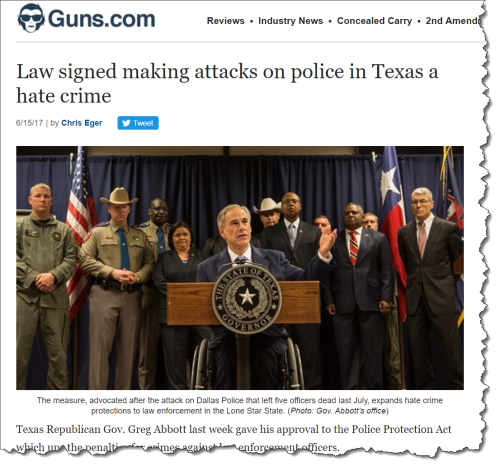Texas Law Says Attacks on Cops Now Constitute a Hate Crime
Governor Greg Abbott continues to tell progressive America: ���Don���t mess with Texas.���
While so-called ���hate crime��� laws have long been a source of controversy, with many believing they essentially punish thought by ascribing extra penalties due to the motivation of a violent crime, rather than solely for the crime itself, there is no denying they���ve gained traction in America���s criminal justice system over the last couple of decades.
Taking a cue from that trend, Texas recently decided to use the sensibilities behind hate crime laws to grant extra protections to their law enforcement officers, passing the Police Protection Act. Governor Abbott put his pen to the measure last week.
As reported by Guns.com, the new law affords police and judges the same special consideration as those persons who are criminally victimized on the basis of race, color, disability, religion, national origin, gender, or sexual preference. It essentially makes cops and judges a protected class, for the purpose of charging those who commit crimes against them.
Effective September 1, assaulting a law enforcement or officer or judge could land someone in the slammer for as much as 20 years, and if the assault causes significant injury, the perpetrator could spend the rest of their life behind bars.
���The men and women in uniform risk their lives every day to protect the public, and it is time we show them the State of Texas has their back,��� said Abbott about the measure. ���Texas will no longer tolerate disrespect for those who serve, and it must be made clear to anyone targeting our law enforcement officials that their actions will be met with severe justice.���
However, many civil rights groups are not at all pleased with the new statute, viewing it as a misguided application of the spirit of hate crime laws.
���Although the work of peace officers is incredibly important, and many put their lives on the line every day, their inclusion into this statute meant to address bias and prejudice is inappropriate,��� said the Texas Civil Rights Project.
By Robert G. Yetman, Jr. Editor At Large




